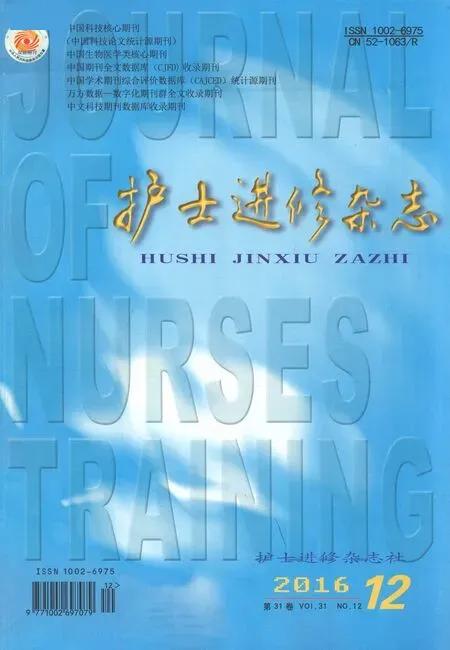乳腺癌患者支持性照护需求的研究进展
2016-03-08周菁鑫王小玲
周菁鑫 王小玲
(上海交通大学医学院附属新华医院老年ICU,上海 200092)
乳腺癌患者支持性照护需求的研究进展
周菁鑫 王小玲
(上海交通大学医学院附属新华医院老年ICU,上海 200092)
乳腺癌; 支持性照护; 护理
Breast cancer; Supportive care; Nursing
乳腺癌居中国女性恶性肿瘤第二位,2008年中国女性乳腺癌新发病例数约16.9万,其发病和死亡情况将在未来20年越来越严重[1]。多数患者会存在消极情绪、疼痛、癌因性疲乏、潮热和身体外形的改变等[2]。对患者提供支持性照护,可以提高患者的护理满意度,但乳腺癌患者对专业的支持性护理服务的利用率却很低,只有少数患者认为自己从护士那里得到了支持性照护且认为她们提供的支持是多元化、有作用的。需求未满足会使患者面临着各种负性的心理问题[3]。本文对乳腺癌患者的支持性照护需求进行综述,旨在为临床采取相应措施提供依据,不断完善教育的内容和形式,为患者提供更优质的护理。
1 乳腺癌患者支持性照护需求概况
1.1 相关定义 支持性照护(Supportive care)是对那些受癌症影响的患者在他们诊断、治疗和后续阶段满足他们的信息、情感、精神、社会、生理需求来促进健康、提高生存率、减轻患者痛苦,它是“以人为本”的体现[4]。支持性照护需求(Supportive care needs)定义为在疾病治疗和管理症状、副作用时产生的对照顾的需求,从而使患者更好地适应和应对病情,形成良好心态,做出决定,将功能衰退降至最低[5]。
1.2 支持性照护的作用 支持性照护能让接受化疗的患者更快地开始化疗并且使其对治疗的依从性更高[6]。对患者进行支持性照护干预,患者的未满足需求降低,且焦虑的症状也较轻[7]。在诊断后和等待手术这段时间对患者提供支持,平衡她们的需求可以让患者对前景充满希望[8]。国外还有通过网上交流来帮助患者提供信息、进行症状管理的形式[9]。
1.3 支持性照护需求 在众多文献中均发现乳腺癌患者支持性照护需求未满足的情况。健康信息支持的需求未满足的情况最为普遍[10-11]。比起其他癌症,乳腺癌患者在生理需求方面感知得较少[12]。国外乳腺癌患者未满足的需求主要体现在健康信息需求和心理需求方面[13]。有学者[14]通过综述发现,亚洲患者存在更多信息需求而西方的患者存在更多的是心理需求,西方患者对性生活的问题也比较关注,性生活需求维度虽然较低,患者却仍然想知道如何维护好与伴侣的关系[15],并且随着时间的增长,患者对这项需求表现得更为强烈[16]。
2 乳腺癌患者支持性照护需求的现状
2.1 不同治疗方式的支持性照护需求
2.1.1 手术治疗 有研究[17]显示:在实行乳腺癌根治术后康复期间和出院后随访期间,患者的需求集中在治疗和健康教育需求方面,包括术后拔管时间、引流管护理、乳腺自查方法,术后活动及功能锻炼、饮食营养等。行手术治疗的患者更注重服务的细节,她们希望医护人员能与她们多沟通,提供更多的心理支持[18]。
2.1.2 化疗 化疗患者在不同的疗程中均表现出较高的信息需求[19]。患者对化疗副作用以及副作用的管理有着强烈的信息需求。对于那些在化疗过程中面临体质量增加的患者,她们希望能得到有关饮食营养的服务,同时希望能得到家庭成员和朋友的帮助[20]。有一项研究[21]显示:尽管医务人员对化疗患者提供了有关营养、锻炼、遗传等方面的信息支持,患者却仍对这些信息不满意,并且对医务人员的沟通方式有着较高的要求。
2.1.3 放疗 放疗也是乳腺癌患者治疗的方法之一,它能大大降低乳腺癌复发的危险性,但由于它的副作用较大也让患者承受着心理、生理方面的痛苦。国外有学者[22]对放疗患者实施了一项纵向研究,他发现在放疗开始前2~3周和放疗结束后10周,患者都存在着未满足的需求,包括信息、生理方面、实际问题和有关生存的问题,如担心癌症复发、压力管理、家庭责任以及担心别人对癌症的理解等。
2.2 不同阶段的支持性照护需求 在不同的时间段,患者的需求不尽相同。
2.2.1 刚确诊时 在刚确诊时,患者有着很高的信息需求,她们希望能在较好的医院得到治疗[23]。乳腺癌患者首次住院,入院和出院时对健康信息需求的内容不同。入院时患者想要知道疾病相关信息,想要获得心理支持。出院时患者更想知道康复锻炼方法和日常生活注意事项。有台湾的学者[24]进行了一项纵向调查,发现患者在刚知道诊断结果时,在心理、信息、性需求方面比知道诊断结果后一个月、两个月、三个月时更高,总体需求程度也最高,而对生理与日常生活维度的需求却是逐步递增。
2.2.2 手术后 患者术后3天的生理需求较为强烈,术后7 d患者的安全需要、自尊需要和自我实现需要较术后3 d更为明显[25]。对在6个月内进行首次治疗且癌细胞没有转移的患者进行横断面调查,患者的最大需求仍在健康信息方面,并且她们对回归工作有着强烈的需求[15]。在确诊疾病后1年,患者需求表现在不知道如何缓解疲劳,如何适应形象上的改变,如掉头发、伤疤,如何维持良好的夫妻关系和怎样进行性生活上[26],长期反复的治疗让她们希望能及时知道检查的结果、疾病的进展、治疗计划和自我保健的管理[27]。治疗后6个月到5年的患者中有一半人存在着至少1项未满足的需求;随着治疗的进行,患者也更关心生存期的问题[28]。日本学者Tatsuo Akechi[29]以1年和3年为结点,加上复发的患者,将研究对象分成4组,他发现诊断为乳腺癌1年内和复发的两个小组有着更高的需求和较低的生活质量]。随着生存时间的延长,患者的需求较之前有所降低[30]。晚期乳腺癌患者在不同时间段各方面的需求程度都保持稳定且低平,其中性需求最低,排在中度到高度需求的前十项均是健康信息支持的需求[31]。
2.3 不同人群的支持性照护需求
2.3.1 不同年龄段的乳腺癌患者 年轻的乳腺癌患者们会担心孩子的照护问题、以后的生育能力、身体形象的改变、工作问题等。小于20岁就成为母亲的并且刚得知诊断结果的患者在心理和日常生活方面需求较高[23]。由于她们的年龄在癌症人群中显得较为特殊,会使她们觉得自己是被孤立的。年龄与需求密切相关,研究[24]表明,年轻患者的需求更强烈,在性需求领域也有更多的需求[23],对乳房再造的需求也较高。虽然手术治疗是控制疾病的最佳选择,但对于老年乳腺癌患者( >75岁)来说,她们会选择内分泌治疗来使损害降至最低。因此,她们想从医务人员那里获得适合她们个人的关于治疗方案的信息,包括对她们独立能力的影响和疾病复发、扩散的风险[32]。老年乳腺癌患者的需求常常被医务人员低估而受不到重视,在治疗过程中还应关注她们的伴随疾病。
2.3.2 不同居住地的乳腺癌患者 农村初诊的乳腺癌患者普遍经济条件较差、文化程度较低,她们有着特殊的照护需求。在一项对加拿大农村妇女的质性研究[33]中,她们表达了想享受更多医疗保健的信息和服务,想融入正常人中不被孤立,想出去旅行、减轻经济压力和处理好工作的想法。几乎所有农村妇女都担心复发,由于农村独特的地理位置,她们觉得距离使她们没有得到所有的支持[34]。国外一篇系统综述[35]中提出,城市妇女比农村妇女在生理与日常生活方面有着较少的需求,在其他领域没有显著的差异。
3 支持性照护需求的影响因素
3.1 人口学因素 文化水平是影响需求的重要因素之一。文化程度高的患者对健康信息需求也更强烈。人口学因素中种族和婚姻状况也会影响患者的生理和日常生活的需求[23]。有工作的妇女对身体外形、工作能力以及可能失去好工作充满不确定感,她们不愿意向自己的雇主和亲戚透露自己的疾病[36]。
3.2 文化差异 文化差异也会影响患者的需求,中国香港的患者比起德国的患者更注重关于疾病和治疗的信息,而德国的患者有更多关于身体、心理和性生活方面的需求[37]。中国的患者比起外国的患者更有家庭观念,有些患者会认为得癌症不可原谅,怕给家人带来坏运气,认为自己的疾病会影响下一代的婚姻幸福。护士在提供支持性照顾时应针对患者的情况满足其需求,并调动患者的家庭成员,因为丈夫和父母是帮助其决策的重要角色。
3.3 疾病相关因素 身体和社交障碍、身体形象受损、缺乏社会支持以及人际关系的冲突都会影响患者的需求[38],病情严重程度也是重要影响因素之一[22]。接受雌激素治疗、处于较低的性能状态的患者都有着较高的需求[39]。国外学者发现较低的生活质量、抑郁、焦虑也会导致有更多未满足的需求。患者困扰的程度越高、抑郁的得分越低会有更多关于健康信息的需求,而焦虑的得分越高患者的心理需求越大[40],她们更希望得到最佳的治疗和护理。除了性需求这一领域,症状越多得分越高的患者面临着更多的需求[28],而需求又密切影响着患者的生活质量[11,27]和满意程度[23]。这提示我们护士在对患者进行护理时也应对患者的症状采取干预措施。
4 乳腺癌患者获得支持性照护需求的方式
患者更喜欢医生或护士直接指导,如由医护人员来讲解与演示,一对一进行专业咨询[12]。在国外,患者也愿意与心理学家进行单独交谈[15],愿意从网络获取信息[16];发放宣传册、参加知识讲座、集体讲授也是比较受欢迎的方式[15]。由于国外患者的需求也体现在来自家庭的支持方面,她们也希望能专门有书面资料是给她丈夫和孩子的[33]。传授的场所绝大多数患者更倾向于在医院,也有少数患者认为可以通过上网、在社区服务中心等[12]。
5 小结
乳腺癌患者有不同程度的支持性照护需求。在健康信息、生理与日常生活、心理、照顾与支持、性维度这5个方面均有需求未满足的情况,其中健康信息需求未满足最为普遍。人口学因素、文化差异和疾病相关因素都会影响患者的支持性照护需求。NICE指南指出对患者的生理、社会、心理、经济和精神需求的评估和管理应成为支持性照顾的关键点。了解患者的需求可以让我们分清哪些需求是比较紧迫的,我们可以以此对服务和可用资源的配置进行调整。护士作为医疗团队中的核心人员,应学会全面评估患者的需求,优先提供患者需要的信息,了解患者的治疗过程、预后,给予心理支持、社会关怀,解决患者的性生活问题,促进患者身体康复和减轻疾病带来的症状等。对那些有着较高需求的个体或群体,我们应研究对策,通过个性化的干预措施来降低她们的伴随问题,帮助患者适应生活、做出决策。
[1] 张敏璐,黄哲宙,郑莹.中国 2008 年女性乳腺癌发病、死亡和患病情况的估计及预测[J].中华流行病学杂志,2012,33(10):1049-1051.
[2] McGarry S,Ward C,Garrod R,et al.An exploratory study into the unmet supportive needs of breast cancer patients[J].European journal of cancer care,2013,22(5):673-683.
[3] Pedersen AE,Hack TF,McClement SE,et al.An exploration of the patient navigator role:Perspectives of younger women with breast cancer[C].Oncology nursing forum,2014,41(1):77-88.
[4] Maguire R,Kotronoulas G,Simpson M,et al.A systematic review of the supportive care needs of women living with and beyond cervical cancer[J].Gynecologic oncology,2015,136(3):478-490
[5] Ream E,Quennell A,Fincham L,et al.Supportive care needs of men living with prostate cancer in England:a survey[J].British journal of cancer,2008,98(12):1903-1909.
[6] Rosenzweig M,Brufsky A,Rastogi P,et al.The attitudes,communication,treatment,and support intervention to reduce breast cancer treatment disparity[C].Oncology nursing forum,2011,38(1):85-89.
[7] Liao MN,Chen SC,Lin YC,et al.Education and psychological support meet the supportive care needs of Taiwanese women three months after surgery for newly diagnosed breast cancer:A non-randomised quasi-experimental study[J].International journal of nursing studies,2014,51(3):390-399.
[8] Dickerson SS,Alqaissi N,Underhill M,et al.Surviving the wait:defining support while awaiting breast cancer surgery[J].Journal of advanced nursing,2011,67(7):1468-1479.
[9] Bender JL,Katz J,Ferris LE,et al.What is the role of online support from the perspective of facilitators of face-to-face support groups? A multi-method study of the use of breast cancer online communities[J].Patient education and counseling,2013,93(3):472-479.
[10] Abdollahzadeh F,Moradi N,Pakpour V,et al.Un-met supportive care needs of Iranian breast cancer patients[J].Asian Pac J Cancer Prev,2014,15:3933-3938.
[11] Park BW,Hwang SY.Unmet needs and their relationship with quality of life among women with recurrent breast cancer[J].Journal of breast cancer,2012,15(4):454-461.
[12] Jansen F,Uden-Kraan CFV.Cancer survivors’ perceived need for supportive care and their attitude towards self-management and eHealth[J].Supportive Care in Cancer,2015:23(6):1679-1688.
[13] Uchida M,Akechi T,Okuyama T,et al.Patients’ supportive care needs and psychological distress in advanced breast cancer patients in Japan[J].Japanese journal of clinical oncology,2011,41(4):530-536.
[14] Fiszer C,Dolbeault S,Sultan S,et al.Prevalence,intensity,and predictors of the supportive care needs of women diagnosed with breast cancer:a systematic review[J].Psycho‐Oncology,2014,23(4):361-374.
[15] Pauwels EEJ,Charlier C,De Bourdeaudhuij I,et al.Care needs after primary breast cancer treatment.Survivors' associated sociodemographic and medical characteristics[J].Psycho‐Oncology,2013,22(1):125-132.
[16] Candidate TARBB.Geographical comparisons of information and support needs of Australian women following the primary treatment of breast cancer:a 10‐year replication study[J].Health Expectations Au international Journal of Public Participation in health care & health Povicy,2014.
[17] 苏晓梅,庄嘉元,骆惠玉,等.乳腺癌根治术后患者康复锻炼认知及需求现状的分析[J].中华现代护理杂志,2013,19(19):2297-2299.
[18] 裴艳,金玉翡,秦嫣雯,等.乳腺癌患者“一站式”服务模式体验的质性研究[J].护士进修杂志,2015,30(3):231-234.
[19] Lei CP,Har YC,Abdullah KL.Informational needs of breast cancer patients on chemotherapy:differences between patients’ and nurses’ perceptions[J].Asian Pac J Cancer Prev,2011,12(3):797-802.
[20] Kwok A,Palermo C,Boltong A.Dietary experiences and support needs of women who gain weight following chemotherapy for breast cancer[J].Supportive Care in Cancer,2015,23(6):1561-1568.
[21] Mika M,Shinji O,Akemi K,et al.Unmet information needs and quality of life in young breast cancer survivors in Japan[J].Cancer nursing,2015,38(6):E1-E11.
[22] Burris JL,Armeson K,Sterba KR.A closer look at unmet needs at the end of primary treatment for breast cancer:A longitudinal pilot study[J].Behavioral Medicine,2015,41(2):69-76.
[23] Griesser AC,Vlastos G,Morel L,et al.Socio-demographic predictors of high support needs in newly diagnosed breast cancer patients[J].European journal of cancer care,2011,20(4):466-474.
[24] Liao MN,Chen SC,Chen SC,et al.Changes and predictors of unmet supportive care needs in Taiwanese women with newly diagnosed breast cancer[C].Oncology nursing forum,2012,39(5):E380-E389.
[25] 王世平,李晓玲.乳房切除术后不同时间病人需求的调查与分析[J].护士进修杂志,2004,19(10):935-937.
[26] Tighe M,Molassiotis A,Morris J,et al.Coping,meaning and symptom experience:A narrative approach to the overwhelming impacts of breast cancer in the first year following diagnosis[J].European Journal of Oncology Nursing,2011,15(3):226-232.
[27] So WKW,Chow KM,Chan HYL,et al.Quality of life and most prevalent unmet needs of Chinese breast cancer survivors at one year after cancer treatment[J].European Journal of Oncology Nursing,2014,18(3):323-328.
[28] Cheng KKF,Devi RD,Wong WH,et al.Perceived symptoms and the supportive care needs of breast cancer survivors six months to five years post-treatment period[J].European Journal of Oncology Nursing,2014,18(1):3-9.
[29] Akechi T,Uchida M,Nakaguchi T,et al.Difference of patient's perceived need in breast cancer patients after diagnosis[J].Japanese journal of clinical oncology,2015,45(1):75-80.
[30] Park BW,Hwang SY.Unmet needs of breast cancer patients relative to survival duration[J].Yonsei medical journal,2012,53(1):118-125.
[31] Lam WWT,Tsang J,Yeo W,et al.The evolution of supportive care needs trajectories in women with advanced breast cancer during the 12 months following diagnosis[J].Supportive Care in Cancer,2014,22(3):635-644.
[32] Burton M,Collins KA,Lifford KJ,et al.The information and decision support needs of older women facing treatment choices for breast cancer:a qualitative study[J].Psycho-Oncology,2015,24(8):878-884.
[33] Gray RE,James P,Manthorne J,et al.A consultation with Canadian rural women with breast cancer[J].Health Expectations,2004,7(1):40-50.
[34] Hubbard G,Venning C,Walker A,et al.Supportive care needs of women with breast cancer in rural Scotland[J].Supportive Care in Cancer Official Journal of the Multinational Association of Supportive Cace in cancer,2015,23(6):1-10.
[35] Butow PN,Phillips F,Schweder J,et al.Psychosocial well-being and supportive care needs of cancer patients living in urban and rural/regional areas:a systematic review[J].Supportive Care in Cancer,2012,20(1):1-22.
[36] Tiedtke C,de Rijk A,Dierckx de Casterlé B,et al.Experiences and concerns about ‘returning to work’for women breast cancer survivors:a literature review[J].Psycho‐Oncology,2010,19(7):677-683.
[37] Lam WWT,Au AHY,Wong JHF,et al.Unmet supportive care needs:a cross-cultural comparison between Hong Kong Chinese and German Caucasian women with breast cancer[J].Breast cancer research and treatment,2011,130(2):531-541.
[38] Schmid-Büchi S,Halfens RJG,Müller M,et al.Factors associated with supportive care needs of patients under treatment for breast cancer[J].European Journal of Oncology Nursing,2013,17(1):22-29.
[39] Harrison SE,Watson EK,Ward AM,et al.Primary health and supportive care needs of long-term cancer survivors:a questionnaire survey[J].Journal of Clinical oncology,2011,29(15):2091-2098.
[40] Li WWY,Lam WWT,Au AHY,et al.Interpreting differences in patterns of supportive care needs between patients with breast cancer and patients with colorectal cancer[J].Psycho‐Oncology,2013,22(4):792-798.
周菁鑫(1991-),女,上海,本科,护士,研究方向:临床护理
王小玲,E-mail:wangxiaoling1983@163.com
R473.71,R737.9
A
10.16821/j.cnki.hsjx.2016.12.011
2015-09-18)
